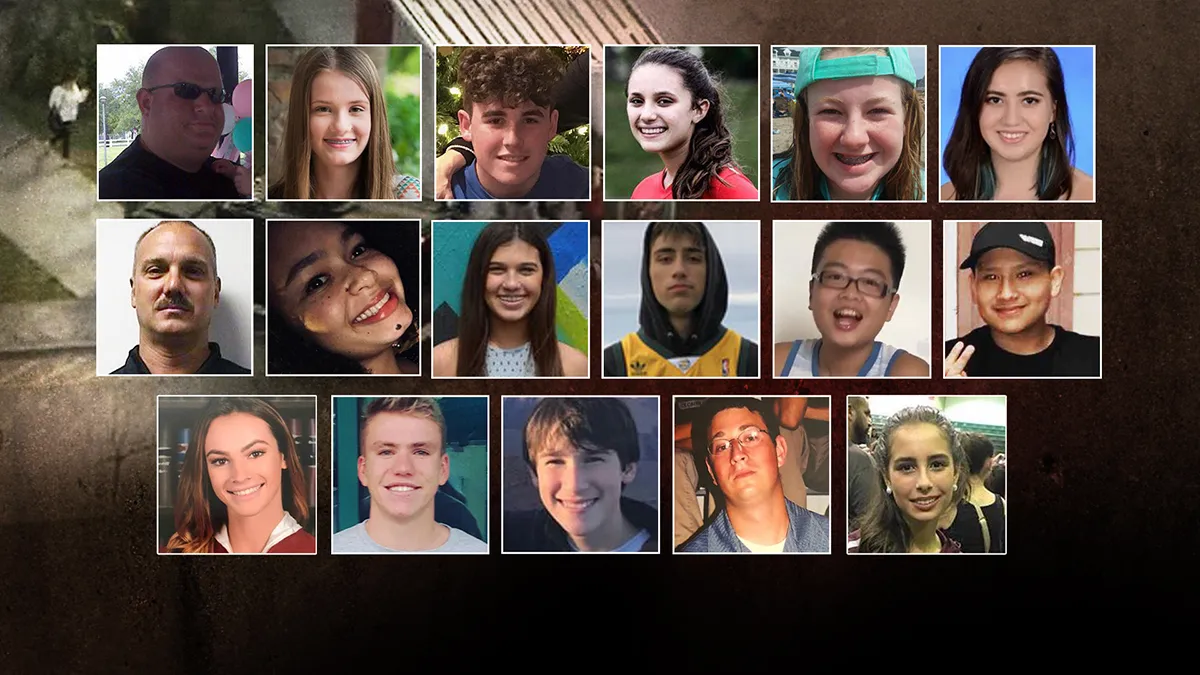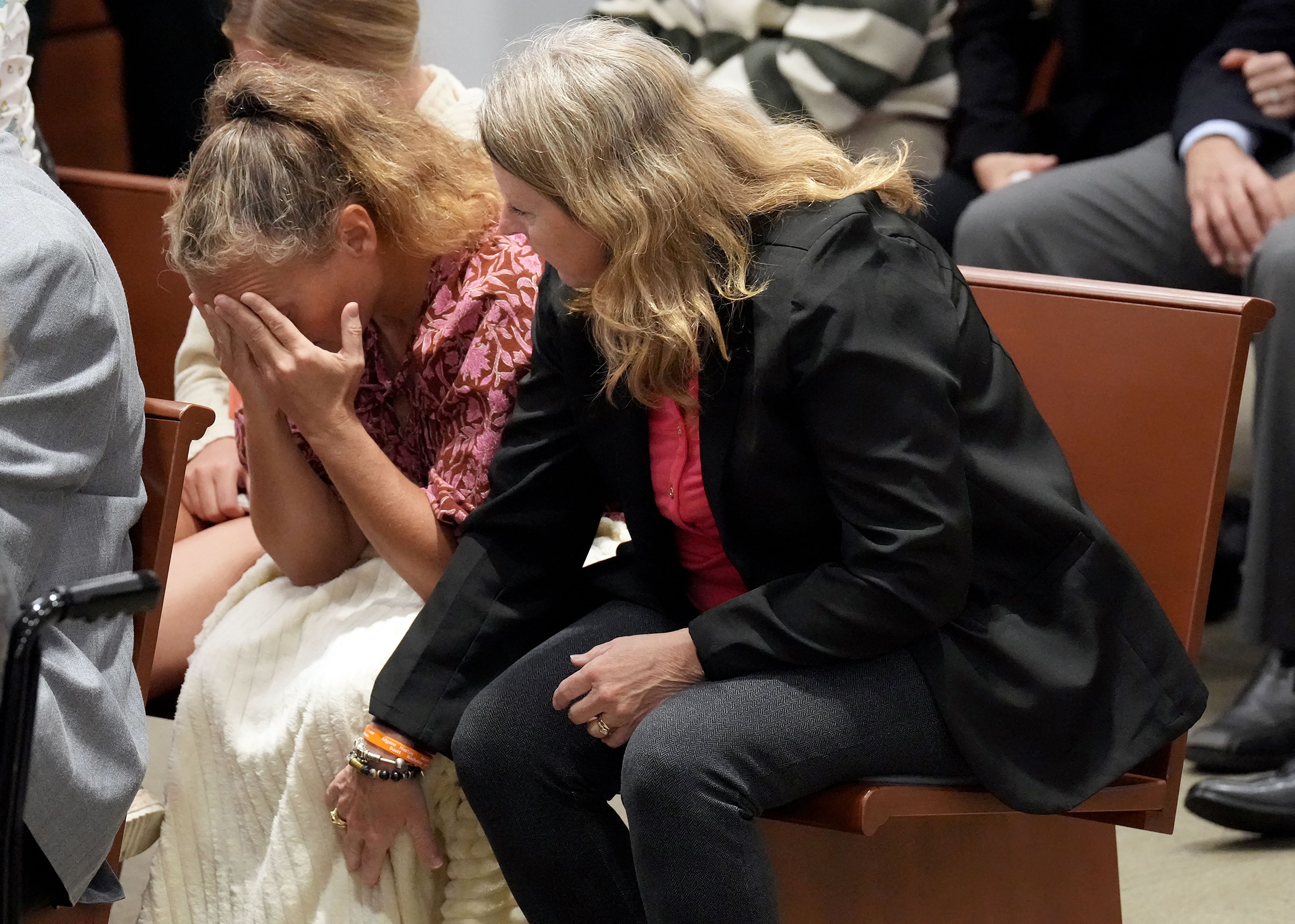What to Know
- Florida school shooter Nikolas Cruz will be sentenced to life without parole for the 2018 murder of 17 people at Parkland’s Marjory Stoneman Douglas High School
- After seven hours of deliberations over two days, the jury said Thursday that it could not unanimously agree that he should be executed
- Circuit Judge Elizabeth Scherer will formally issue the life sentence on Nov. 1
More than four-and-a-half years after 17 people were killed and 17 others were wounded in the Parkland school shooting, a jury has determined that the man responsible should spend the rest of his life behind bars.
Watch NBC6 free wherever you are
>The seven-man, five-woman jury began deliberations Wednesday morning and returned Thursday morning to reject a death sentence for Nikolas Cruz.
Since the jury could not unanimously agree that Cruz should be executed for at least one victim, he will now be sentenced to life without parole. Judge Elizabeth Scherer cannot overrule the jury.
Get local news you need to know to start your day with NBC 6's News Headlines newsletter.
>Angry parents and family members shook their heads and wiped tears from their eyes as Scherer spent more than an hour reading through the jury's decision on the murders of all 17 victims. Cruz, his hair unkempt, largely sat hunched over and stared at the table as the jury’s recommendations were read.
REMEMBERING PARKLAND
Cruz, 24, pleaded guilty a year ago to murdering 14 students and three staff members and wounding 17 others at Marjory Stoneman Douglas High School on Feb. 14, 2018.
The formal sentencing will take place Nov. 1, Scherer said.
After Thursday's hearing ended, victim family members expressed their shock and disappointment in the jury's decision.
"We are beyond disappointed with the outcome today, this should have been the death penalty, 100%," said Lori Alhadeff, whose daughter, Alyssa, was killed in the shooting. "I do not understand, I just don't understand this."
"I'm disgusted with our legal system, I'm disgusted with those jurors," father Ilan Alhadeff said. "I pray that that animal suffers every day of his life in jail, and he should have a short life."
Tony Montalto, who lost his 14-year-old daughter Gina, called the jury's decision a "gut-punch."
"What do we want as a society, do we want people who commit atrocious acts against the future of our country to be punished to the fullest extent of the law? Or do we want to excuse them because they had a tough time growing up?" he said.
“This is insane. Everyone knows right? This is insane,” Chen Wang, cousin of shooting victim Peter Wang, said at a news conference after the jury’s decision was announced. “We need justice.”
A former student of the school, Cruz said he chose Valentine’s Day to make it impossible for Stoneman Douglas students to celebrate the holiday ever again.
The massacre is the deadliest mass shooting that has ever gone to trial in the U.S. Nine other people in the U.S. who fatally shot at least 17 people died during or immediately after their attacks by suicide or police gunfire. The suspect in the 2019 massacre of 23 at an El Paso, Texas, Walmart is awaiting trial.
The jury's decision closes the nearly three-month sentencing trial that began on July 18.
Lead prosecutor Mike Satz, the 80-year-old former Broward County state attorney, kept his main case simple, focusing on Cruz's eight months of planning, the seven minutes he stalked the halls of a three-story classroom building, firing 140 shots with an AR-15-style semiautomatic rifle, and his escape.
He played security videos of the shooting and showed gruesome crime scene and autopsy photos. Teachers and students testified about watching others die. He took the jury to the fenced-off building, which remains blood-stained and bullet-pocked. Parents and spouses gave tearful and angry statements about their loss.
The gunman’s attorneys repeatedly objected that Satz’s case went beyond what was legally allowable or necessary and was aimed primarily at inflaming the jurors’ emotions — objections that were denied by Scherer.
There was little doubt Satz would be able to prove the killings were "cold, calculated and premeditated," that the shooter's actions were “heinous, atrocious or cruel” and “created a great risk to many persons ” and four other aggravating circumstances listed in Florida law that made him eligible for the death sentence. But Satz also had to give them heft as they must, in the jurors’ unanimous opinion, “outweigh” the mitigating factors the defense presented.
Cruz's attorneys never questioned the horror he inflicted, but focused on their belief that his birth mother's heavy drinking during pregnancy left him with fetal alcohol spectrum disorder. Their experts said his bizarre, troubling and sometimes violent behavior starting at age 2 was misdiagnosed as attention-deficit/hyperactivity disorder, meaning he never got the proper treatment. That left his widowed adoptive mother overwhelmed, they said.
Defense attorneys called Cruz's psychiatrists and psychologists and teachers from his preschool, elementary and middle school years — they all testified he was a slow developing child who hurt others, had frequent outbursts, made threats and had few friends.
The defense cut their case short, calling only about 25 of the 80 witnesses they said would testify. They never brought up Cruz's high school years or called his younger half-brother, Zachary, whom they accused of bullying.
The abrupt resting of their case led to a tense exchange between lead attorney Melisa McNeill and Scherer, who called the decision without warning to her or the prosecution "the most uncalled for, unprofessional way to try a case."
“To have 22 people march into court and be waiting as if it is some kind of game. I have never experienced such a level of unprofessionalism in my career," Scherer said, raising her voice.
McNeill countered angrily, “You are insulting me on the record in front of my client," before Scherer told her to stop. Scherer then laid into McNeill, with whom she has had a testy relationship since pretrial hearings began more than three years ago.
"You’ve been insulting me the entire trial,” Scherer barked at McNeill. “Arguing with me, storming out, coming late intentionally if you don’t like my rulings. So, quite frankly, this has been long overdue. So please be seated."
After the exchange, the defense filed a motion for Scherer to remove herself from the case, noting that Scherer held a longstanding animosity toward McNeill. Scherer denied the motion, and the case carried on.
In their rebuttal, Satz and his team contended that the gunman did not suffer from fetal alcohol damage but has antisocial personality disorder — in lay terms, he’s a sociopath. Their witnesses said the shooter faked brain damage during testing and that he was capable of controlling his actions, but chose not to. For example, they pointed to his employment as a cashier at a discount store where he never had any disciplinary issues.
Prosecutors also played numerous video recordings of Cruz discussing the crime with their mental health experts where he talked about his planning and motivation.
The defense used their cross-examination during the rebuttal case to allege the gunman was sexually molested and raped by a 12-year-old neighbor when he was 9.
Most of the victims' family members had said they were in favor of a death sentence for the gunman. Many of them attended every day of the trial knowing that whatever the outcome, their families have been devastated.
These are the 17 people killed in the Parkland school shooting:
Alyssa Alhadeff, 14
Scott Beigel, 35
Martin Duque, 14
Nicholas Dworet, 17
Aaron Feis, 37
Jaime Guttenberg, 14
Chris Hixon, 49
Luke Hoyer, 15
Cara Loughran, 14
Gina Montalto, 14
Joaquin Oliver, 17
Alaina Petty, 14
Meadow Pollack, 18
Helena Ramsay, 17
Alex Schachter, 14
Carmen Schentrup, 16
Peter Wang, 15



